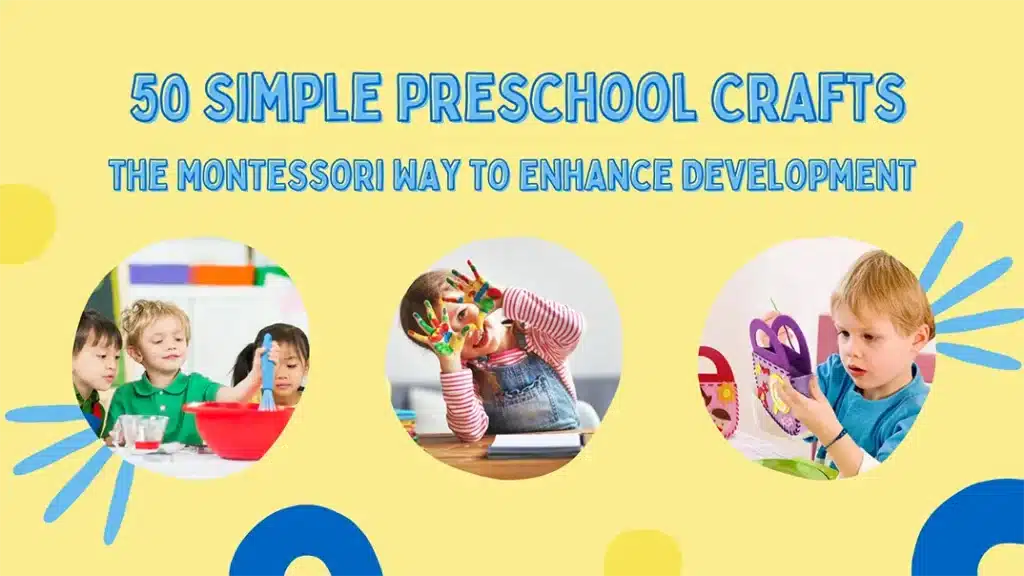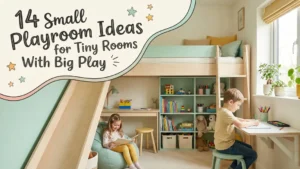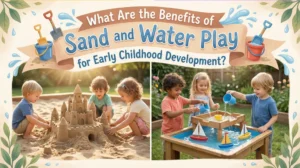Are you looking for fun and educational ways to engage preschoolers? Struggling to find crafts that enhance development while being easy to implement? Want to create a meaningful learning experience without spending hours planning?
Crafts in the Montessori style offer a simple yet effective way to develop a child’s creativity and motor skills. These activities allow children to explore their world through hands-on experiences that build confidence and understanding. With 50 easy-to-follow ideas, you can foster your child’s development while keeping them engaged.
Keep reading to discover how these Montessori-inspired preschool crafts can help in the development of your little learners
The Montessori Philosophy in Preschool Crafts
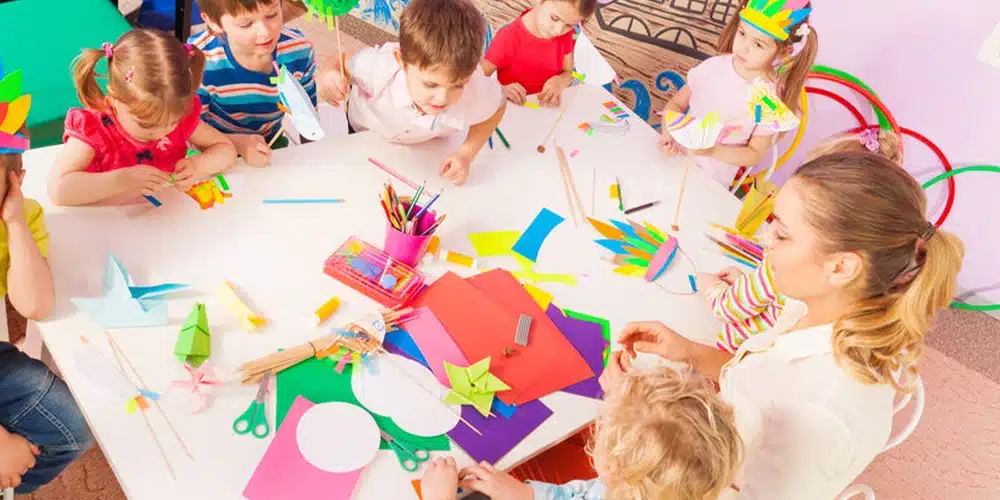
Crafting with children is more than just a fun and engaging way to spend time together. It is vital to their early development, particularly in a Montessori learning environment where hands-on activities are central to growth. The characteristics of preschool crafts the Montessori way include:
- Self-Guided and Free Choice: Children can choose the materials and activities for preschool crafts based on their interests and needs. Teachers typically provide a range of materials and tools but do not impose specific projects, encouraging independent thinking and practice.
- Development of Fine Motor Skills: By using tools like scissors, glue, needles, and brushes, children exercise their fine motor skills and improve hand-eye coordination during handcraft activities.
- Fostering Creativity and Imagination: Preschool crafts offer a space for children to unleash their creativity and imagination, allowing them to express their thoughts and feelings, and develop independent thinking.
- Practical and Sensory Learning: Montessori emphasizes sensory learning, and preschool crafts involve more than just skill development. They also provide opportunities to engage children’s senses, such as touch, sight, and sometimes sound, as they work with various materials, feeling different textures and shapes.
- Cultivating Focus and Patience: Preschool crafts usually require extended concentration, helping children develop sustained attention. Each step of the process requires patience and precision, teaching children perseverance and focus.
- Connection to Real-Life Experiences: Montessori education links learning to everyday life, and handcraft activities often relate to real-world experiences, helping children better understand and adapt to the world around them.
- Emphasis on the Process, Not Just the Result: Montessori education values the learning process over the final product. Through preschool crafts, children gain more learning experiences by exploring and solving problems.
Spring Crafts for Preschoolers
Spring is a season of growth and renewal, and it’s an ideal time for preschoolers to engage in hands-on, Montessori-inspired craft activities. The Montessori approach values independence, creativity, and learning through sensory experiences, and spring crafts provide ample opportunities to explore nature’s vibrant colors, textures, and patterns.
1. DIY Spring Bird Feeder

Materials Needed:
- Toilet paper rolls
- Peanut butter (or shortening for allergies)
- Bird seed
- String or ribbon
Preschool Crafts Instructions:
- Spread peanut butter all over the outside of the toilet paper roll.
- Roll the peanut butter-covered toilet paper roll in bird seed until it is fully coated.
- Tie a piece of string through the hole in the roll for hanging.
- Hang the bird feeder outside for local birds to enjoy.
Developmental Benefits: Spring crafts for preschoolers promote sensory exploration (through the texture of peanut butter), teaches responsibility, and connects children with nature. It also helps develop fine motor skills as they spread the peanut butter and roll the tube in bird seed.
2. Handprint Butterfly Craft

Materials Needed:
- Construction paper
- Paint (various colors)
- Scissors
- Glue
- Markers
Preschool Crafts Instructions:
- Paint the palms of your child’s hands with a vibrant color and have them press their hands onto a piece of paper to make the butterfly wings.
- Once the handprints dry, cut them out to form the butterfly’s wings.
- Use a different color to draw a body for the butterfly in the center of the handprints.
- Add antennae with markers or small pieces of paper.
Developmental Benefits: This activity encourages creativity and hand-eye coordination. It also provides a sensory experience with the feel of the paint and the handprint process.
3. Spring Birds with Paper Plates

Materials Needed:
- Markers or crayons
- Paper plates
- Construction paper (yellow, orange, black)
- Scissors
- Glue
Preschool Crafts Instructions:
- Cut a paper plate in half to form the bird’s body.
- Color the paper plate yellow or paint it in a bright spring color.
- Cut out a beak, eyes, and wings from the construction paper. You can also add a feather or a small tuft of cotton for extra fun.
- Glue the beak, eyes, and wings onto the paper plate.
- Draw legs and details using a marker or crayon.
Developmental Benefits: Spring crafts for preschoolers encourage creativity, improves fine motor skills, and teaches children about different animals. It also helps with shape recognition and the coordination needed to use scissors.
4. Nature Collage with Spring Leaves and Flowers
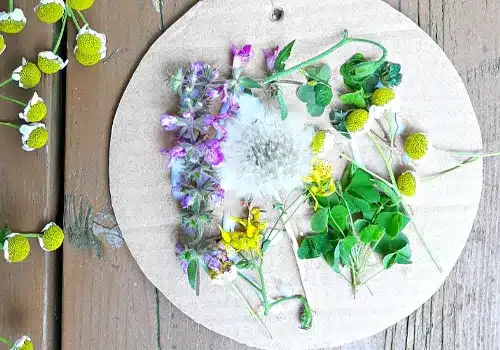
Materials Needed:
- Markers (optional)
- Construction paper
- Natural items such as small flowers, leaves, twigs
- Glue
Preschool Crafts Instructions:
- Take the children outside to collect small items like leaves, flowers, and twigs.
- Once back inside, arrange the items on construction paper to form a collage.
- Glue the items in place, adding extra details with markers if desired.
- Allow the collage to dry before displaying.
Developmental Benefits: This nature-inspired craft connects children with the outdoors, encourages exploration, and provides a sensory experience. It also promotes problem-solving as they figure out how to arrange and glue the different pieces together.
Summer Crafts for Preschoolers
As the days get longer and the sun shines brighter, summer presents an ideal time to dive into fun, hands-on craft activities that embrace the vibrant spirit of the season. Summer crafts for preschoolers offer endless opportunities to explore color, texture, and the natural world, all while enhancing fine motor skills and fostering creativity.
5. Paper Plate Sun Craft
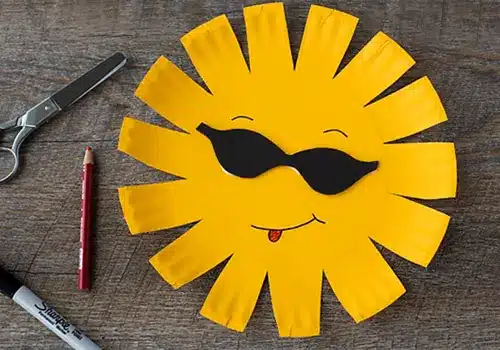
Materials Needed:
- Markers or crayons
- Paper plates
- Yellow paint
- Orange, red, and yellow construction paper
- Scissors
- Glue
Preschool Crafts Instructions:
- Start by painting the paper plate yellow to create the sun’s face.
- While the plate dries, cut out sun rays from orange, red, and yellow construction paper.
- Once the plate is dry, glue the rays around the edges of the paper plate.
- Draw a happy face on the center of the plate using markers or crayons.
Developmental Benefits: Summer crafts for preschoolers help improve fine motor skills through cutting and gluing. It also encourages creativity as children decide on the color and design of their sun.
6. Ice Cream Cone Craft

Materials Needed:
- Markers or crayons (optional)
- Construction paper (brown for cone, various colors for ice cream)
- Scissors
- Glue
- Buttons
Preschool Crafts Instructions:
- Cut a triangle shape from brown construction paper to form the cone of the ice cream.
- Cut out circles of different colors for the ice cream scoops.
- Glue the scoops of ice cream on top of the cone.
- Optionally, decorate the ice cream with sprinkles, chocolate chips, or syrup using markers or crayons.
Developmental Benefits: Summer crafts for preschoolers encourage color recognition, creativity, and fine motor skills through cutting and gluing.
7. Paper Plate Fish

Materials Needed:
- Googly eyes (optional)
- Paper plates
- Blue paint (for the ocean)
- Colorful construction paper
- Scissors
- Glue
Preschool Crafts Instructions:
- Paint the paper plate blue to represent the ocean.
- Cut out fish shapes from colorful construction paper.
- Glue the fish onto the paper plate, arranging them in different positions.
- Add googly eyes to the fish (optional) and create additional details with markers or crayons.
Developmental Benefits: Ocean crafts for preschoolers help with fine motor skills, creativity, and understanding of ocean life. Children also get to explore patterns and colors while making their fish.
8. Paper Straw Wind Chimes

Materials Needed:
- Hole punch
- Straws (colored or plain)
- String or yarn
- Beads or buttons
- Scissors
Preschool Crafts Instructions:
- Cut the straws into smaller pieces of various lengths.
- Use a hole punch to create a hole at the top of each straw piece.
- Cut a piece of string or yarn and thread the straws and beads onto it to make a wind chime.
- Hang the finished wind chime outside and listen to the gentle sounds it makes when the wind blows.
Developmental Benefits: This activity helps with fine motor skills, sequencing, and understanding the cause-and-effect relationship (when the wind blows, the chimes make sound).
Fall Preschool Crafts Ideas
With the crisp air, colorful leaves, and harvest celebrations, fall is a wonderful season for crafting. Fall crafts for preschoolers are designed to celebrate the beauty of autumn while supporting the development of creativity and fine motor skills. Fall also offers a perfect opportunity for preschoolers to learn about the changing seasons and the natural world in a fun and hands-on way. These activities are an ideal way to embrace the spirit of fall while fostering early childhood development.
9. Pinecone Hedgehogs

Materials Needed:
- Scissors
- Pinecones
- Googly eyes
- Construction paper
- Glue
Preschool Crafts Instructions:
- Start by gluing googly eyes onto the larger end of the pinecone.
- Cut out a small triangular nose from orange construction paper and glue it to the tip of the pinecone.
- Use the brown construction paper to cut out small spikes and glue them onto the body of the pinecone to create the hedgehog’s spiky coat.
- Let the craft dry before displaying.
Developmental Benefits: Fall preschool crafts enhance fine motor skills through cutting and gluing and gives children a tactile sensory experience with the pinecone texture. It also fosters creativity as they assemble their hedgehogs.
10. Fall Leaf Garland
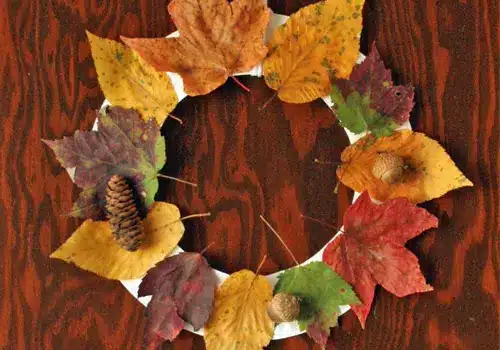
Materials Needed:
- Glue or a hole puncher
- Colorful fall leaves
- String or yarn
Preschool Crafts Instructions:
- If using real leaves, carefully collect fallen leaves from the yard, or cut leaf shapes from construction paper.
- Have the children decorate or color the paper leaves with markers or crayons.
- Punch holes in the top of each leaf (or glue the leaves directly onto the string).
- String the leaves onto a piece of yarn, creating a festive garland.
- Hang the garland on a wall or in a window to celebrate the season.
Developmental Benefits: Leaf Crafts for Preschoolers help with fine motor skills, creativity, and an understanding of nature’s seasonal changes. It’s also a wonderful collaborative project if done in groups.
11. Handprint Tree Craft

Materials Needed:
- Glue
- Brown construction paper
- Various colors of paint (red, yellow, orange, and brown)
- White paper
- Scissors
Preschool Crafts Instructions:
- Cut out a large tree trunk from the brown construction paper and glue it to the white paper.
- Dip each of the child’s hands into different fall-colored paints (red, yellow, orange, and brown) and have them press their handprints around the tree trunk to create the leaves of the tree.
- Allow the handprints to dry, and you can even add extra decorations like small critters or birds on the tree.
Developmental Benefits: Fall preschool crafts strengthen hand muscles through the handprint process, encourages creativity, and helps children understand the concept of autumn and trees losing their leaves.
12. Apple Stamps

Materials Needed:
- Paper plates
- Apples
- Knife (for adult use)
- Paint
- Paper
Preschool Crafts Instructions:
- Cut an apple in half horizontally so the star shape inside is visible.
- Dip the flat side of the apple into paint (preferably red, yellow, or green to mimic real apples).
- Press the apple onto a sheet of paper to create a stamped apple print.
- Let the children use different colors and make multiple prints to create a pattern or collage.
Developmental Benefits: Apple crafts for preschoolers are great for sensory exploration, creativity, and fine motor skills. It also helps children understand the concept of shapes and symmetry.
Winter Crafts for Preschoolers
Winter brings with it a magical atmosphere, full of sparkling snowflakes, cozy mittens, and holiday cheer. Winter crafts for preschoolers not only tap into the joy of the season but also offer valuable opportunities for children to strengthen their fine motor skills, creativity, and sensory awareness.
13. Paper Plate Penguin

Materials Needed:
- Googly eyes (optional)
- Paper plates
- Black, white, and orange construction paper
- Glue
- Scissors
Preschool Crafts Instructions:
- Paint the paper plate black, leaving a white section in the middle to represent the penguin’s belly.
- Cut out two small white circles for the penguin’s eyes, and a small orange triangle for the beak.
- Cut out flipper shapes from black construction paper and glue them onto the sides of the paper plate.
- Add googly eyes (optional) and draw feet at the bottom of the plate.
Developmental Benefits: This craft fosters fine motor skills through cutting and gluing. It also helps develop color recognition and provides an opportunity to learn about penguins.
14. Snowman Handprint Craft
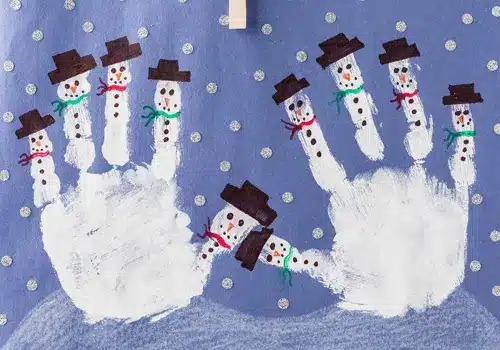
Materials Needed:
- White paint
- Blue construction paper or cardstock
- Markers (black, orange, green, red)
- Scissors
- Paintbrush
- A piece of ribbon or yarn (for scarves)
- Small cotton balls
Preschool Crafts Instructions:
- Start by painting the child’s hands with white paint, covering the palms and fingers completely.
- Place the painted hands on the blue paper, with the fingers spread out and facing down. Press firmly to leave an imprint. This forms the snowman’s body.
- Once the handprints dry, use black markers to draw a small top hat on the “snowmen” formed by the fingers.
- Draw eyes and a carrot-shaped nose on each finger using orange and black markers.
- Add a small scarf around the neck area using green or red markers or even small pieces of yarn for a fun touch.
- You can create the effect of snow by dotting small white paint or using cotton balls as little snowflakes around the handprint snowmen. These add extra texture and a realistic winter feel.
- Allow the painting to dry fully. You can add any other decorative elements like snow hills at the bottom using a little more white paint or even some glitter for extra sparkle.
Developmental Benefits: Winter crafts for preschoolers promote fine motor skills through cutting, gluing, and drawing. It also encourages creativity and self-expression.
15. Snowflake Suncatcher

Materials Needed:
- Glitter
- Contact paper
- White tissue paper
- Scissors
Preschool Crafts Instructions:
- Cut a piece of contact paper to your desired size.
- Have the child tear or cut the white tissue paper into small pieces and stick them onto the sticky side of the contact paper to form a snowflake shape.
- You can add glitter for extra sparkle, then cover the tissue paper with another piece of contact paper.
- Cut the snowflake shape out and hang it in a window to catch the light.
Developmental Benefits: Winter crafts for preschoolers promote fine motor skills, color recognition, and sensory development. It also creates a beautiful display to brighten up a wintery day.
Preschool Thanksgiving Craft Ideas
Thanksgiving is a time to reflect on gratitude, and these Montessori-inspired crafts offer preschoolers a chance to practice fine motor skills and self-expression. By creating handprint turkeys or thankful trees, children engage in sensory exploration while learning to focus and appreciate the things they are thankful for. These hands-on activities encourage independence and creativity, allowing children to reflect on the holiday while developing key developmental skills.
16. Turkey Headband

Materials Needed:
- Stapler or tape
- Brown construction paper
- Red, yellow, orange, and green construction paper
- Scissors
- Glue
Preschool Crafts Instructions:
- Cut a strip of brown construction paper long enough to fit around your child’s head and staple or tape it together to form a headband.
- Cut out a turkey head and feathers from the other colored construction paper.
- Attach the feathers to the back of the headband.
- Glue the turkey head to the front and draw eyes, a beak, and a wattle using markers.
- Let the headband dry before wearing it for Thanksgiving fun!
Developmental Benefits: This craft helps with fine motor skills and creative thinking as children cut, glue, and assemble the headband. It also fosters a sense of accomplishment when they wear their creation.
17. Fall Leaves Turkey Craft

Materials Needed:
- Markers
- Construction paper
- Red construction paper
- Googly eyes
- Colorful fall leaves
- Scissors
- Glue
Preschool Crafts Instructions:
- Cut out a simple oval shape from the brown construction paper to form the turkey’s body.
- Cut out a small triangle from the orange construction paper to make the turkey’s beak.
- Cut out two small ovals for the feet and glue them to the bottom of the turkey’s body.
- Use the red paper to cut out a teardrop shape for the wattle and glue it on.
- Attach the googly eyes to the turkey’s face.
- Collect colorful fall leaves or use artificial ones if needed. Arrange them around the back of the turkey’s body to create a colorful tail. Glue them down securely.
- Once everything is glued in place, let it dry. Optionally, use a marker to add details, such as lines on the turkey’s feet or additional decoration to the leaves.
Developmental Benefits: This craft allows preschoolers to work on their fine motor skills through cutting, gluing, and arranging the leaves. It also encourages creativity by letting them arrange the leaves and design the turkey’s features. Additionally, it helps children learn about Thanksgiving, fall leaves, and gratitude.
18. Thankful Tree Craft

Materials Needed:
- Markers or crayons
- Brown construction paper
- Colored construction paper (fall colors)
- Scissors
- Glue
Preschool Crafts Instructions:
- Cut out a large tree trunk from brown construction paper and glue it to a piece of larger construction paper.
- Cut out leaf shapes from the colored construction paper. (You can use fall colors like red, yellow, and orange.)
- Ask the child to write or draw something they are thankful for on each leaf.
- Glue the leaves around the tree to create the “Thankful Tree.”
Developmental Benefits: This craft fosters fine motor skills through cutting and gluing, and encourages children to reflect on the things they are grateful for. It also introduces children to gratitude in a creative way.
19. Turkey Crafts for Preschoolers

Materials Needed:
- Small triangle for the turkey’s beak
- Empty toilet paper roll
- Construction paper
- Scissors
- Glue
- Googly eyes
- Marker (for writing)
Preschool Crafts Instructions:
- Cover the toilet paper roll with brown construction paper and glue it in place.
- Glue googly eyes on the roll.
- Cut and glue a small orange triangle for the beak and a red teardrop for the wattle below it.
- Cut out feathers from colorful paper.
- Write something you’re thankful for on each feather.
- Glue the feathers to the back of the toilet paper roll to form a fan shape.
Developmental Benefits: Cutting, gluing, and arranging the feathers help children develop their hand-eye coordination and fine motor skills. This craft encourages children to think about the things they are thankful. Decorating the turkey and arranging the feathers offers an opportunity for creativity and self-expression.
Halloween Crafts for Preschoolers
Halloween provides a fun opportunity for preschoolers to explore creativity in a hands-on way, following Montessori principles. Crafts like making friendly ghosts, pumpkins, or monster masks allow children to work independently while honing fine motor skills and problem-solving abilities. These activities encourage imagination, concentration, and creativity, making Halloween a season of learning and fun for young children.
20. Paper Cup Pumpkin

Materials Needed:
- Brown construction paper (for the stem)
- Orange paper cups
- Green construction paper
- Scissors
- Glue
Preschool Crafts Instructions:
- Turn the orange paper cup upside down to create the pumpkin base.
- Cut a small piece of brown construction paper to form the pumpkin’s stem and glue it to the top of the cup.
- Cut out green leaves or vines from green construction paper and glue them around the top of the cup.
- Optional: Decorate the pumpkin with extra details like a face for a jack-o’-lantern effect.
Developmental Benefits: This craft helps with fine motor skills through cutting and gluing, and teaches children about pumpkins. It’s also a great activity to learn about autumn.
21. Paper Plate Jack-O’-Lantern

Materials Needed:
- Green pipe cleaners
- Paper plate
- Orange paint or orange construction paper
- Black construction paper
- Scissors
- Glue
Preschool Crafts Instructions:
- Paint the paper plate orange or glue orange construction paper to the plate.
- Cut out a pumpkin face from black construction paper (eyes, nose, and mouth) and glue them to the plate.
- Cut a small rectangle from the green paper, curl it into a spiral, and glue it to the top of the pumpkin to make the stem.
- Let the craft dry before displaying.
Developmental Benefits: This craft helps with fine motor skills through cutting, gluing, and painting. It also encourages creativity and introduces children to Halloween traditions.
22. Halloween Mask Craft

Materials Needed:
- Glue
- Cardstock or construction paper
- Markers, crayons, or paint
- Scissors
- Elastic string or ribbon
Preschool Crafts Instructions:
- Cut a mask shape out of cardstock or construction paper, making sure to cut out eye holes.
- Use markers, crayons, or paint to decorate the mask with Halloween themes like a monster, bat, or pumpkin face.
- Attach elastic string or ribbon to the sides so the mask can be worn.
- Let the mask dry before wearing it.
Developmental Benefits: Halloween crafts for preschoolers allow children to express their creativity and imagination while improving fine motor skills through cutting and decorating.
23. Spider Craft with Pipe Cleaners

Materials Needed:
- Scissors
- Black pipe cleaners (for the spider legs)
- Black pom-pom (for the body)
- Googly eyes
- Glue
Preschool Crafts Instructions:
- Glue the black pom-pom onto a piece of paper.
- Cut 8 black pipe cleaners in half (to make 16 legs) and bend them to form the spider’s legs.
- Attach the pipe cleaner legs to the pom-pom body.
- Glue googly eyes on the pom-pom to complete the spider’s face.
Developmental Benefits: Halloween crafts for preschoolers help improve fine motor skills by twisting, gluing, and positioning the spider legs. It also enhances creativity as children design their own spooky spider!
Preschool Christmas Crafts Ideas
Christmas crafts offer preschoolers the chance to engage with the season through creativity and hands-on learning, in line with Montessori principles. These activities encourage independent exploration of colors, textures, and materials, helping to develop fine motor skills, hand-eye coordination, and imagination.
24. Paper Plate Santa Claus
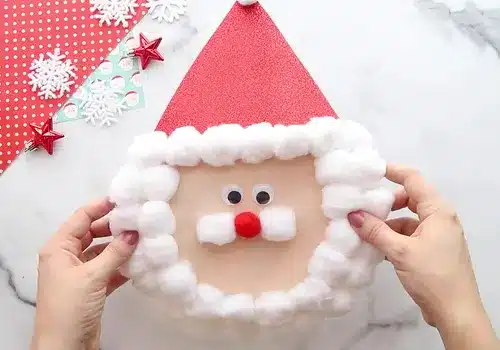
Materials Needed:
- Scissors
- Paper plate
- Red construction paper
- Cotton balls
- Black marker
- Glue
Preschool Crafts Instructions:
- Color the rim of the paper plate red to form Santa’s hat.
- Glue cotton balls around the edge of the plate for Santa’s beard.
- Cut a small triangle from red construction paper to form the hat’s tip and glue it to the top of the plate.
- Add a cotton ball at the tip of the hat and glue two more cotton balls in the center for the mustache and nose.
- Use the black marker to draw eyes and a smile.
Developmental Benefits: This craft helps with fine motor skills through cutting, gluing, and coloring. It also allows creativity while building an understanding of Christmas traditions.
25. Paper Roll Reindeer
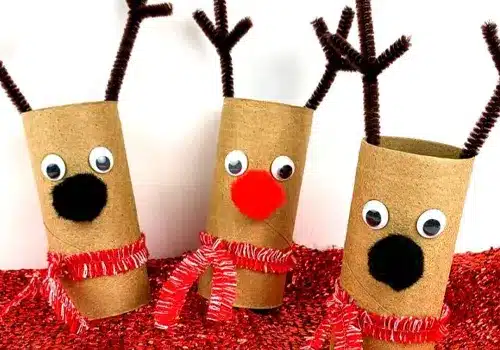
Materials Needed:
- Black marker
- Empty toilet paper roll
- Brown construction paper
- Googly eyes
- Red pom-pom (for the nose)
- Scissors
- Glue
Preschool Crafts Instructions:
- Cover the toilet paper roll with brown construction paper and glue it in place.
- Cut out two antler shapes from brown paper and glue them to the top of the roll.
- Glue googly eyes to the roll and attach a red pom-pom for the nose.
- Use a black marker to draw a smile and other features on the face.
Developmental Benefits: This craft helps develop fine motor skills and coordination through gluing, cutting, and assembling the reindeer. It also encourages creative thinking.
26. Popsicle Stick Christmas Tree
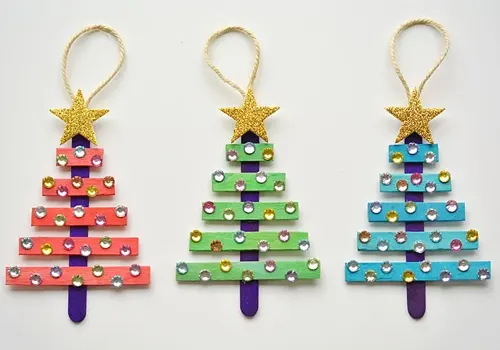
Materials Needed:
- Markers or paint for decorating
- Popsicle sticks (green and brown)
- Glue
- Star stickers or yellow construction paper for the star
Preschool Crafts Instructions:
- Glue three popsicle sticks in a triangle shape to form the tree.
- Use more popsicle sticks horizontally to create the tree’s layers.
- Decorate the tree with colorful markers, beads, or glitter.
- Cut a small star from yellow paper and glue it to the top of the tree.
- Optionally, glue a small brown popsicle stick at the bottom for the tree trunk.
Developmental Benefits: This craft enhances fine motor skills through gluing and decorating. It also allows children to explore shapes, colors, and patterns while learning about Christmas.
27. Salt Dough Ornaments

Materials Needed:
- Paint
- 1 cup of flour
- 1/2 cup of salt
- 1/4 cup of water
- Rolling pin
- Christmas-shaped cookie cutters
- Ribbon or string
Preschool Crafts Instructions:
- Mix flour, salt, and water to form a dough. Knead until smooth.
- Roll the dough out with a rolling pin to about 1/4 inch thick.
- Use cookie cutters to create Christmas shapes (such as stars, trees, or angels).
- Make a small hole at the top of each ornament using a straw for threading ribbon.
- Bake the ornaments at 200°F for 2-3 hours (or until dry) or air-dry overnight.
- Once dry, paint the ornaments and let them dry completely before adding a ribbon.
Developmental Benefits: Preschool christmas crafts provide a tactile sensory experience and encourages creativity. It also helps preschoolers practice measuring, rolling, and fine motor skills when handling small objects.
Easter Crafts for Preschoolers
Easter is a wonderful time to celebrate creativity and gratitude, and it’s a perfect opportunity for Montessori-inspired crafts. These hands-on activities encourage children to explore colors, textures, and shapes independently, while promoting fine motor skills, sensory exploration, and self-expression.
28. Paper Plate Easter Bunny

Materials Needed:
- Pink marker (for nose)
- Paper plates
- Pink and white construction paper
- Scissors
- Glue
- Googly eyes
- Pink pom-pom
Preschool Crafts Instructions:
- Cut out two large bunny ears from the white construction paper and smaller pink pieces to glue inside the ears.
- Paint or color the paper plate white to form the bunny’s face.
- Glue the ears to the top of the plate.
- Glue googly eyes to the plate and use a pink marker to draw a nose.
- Optionally, add whiskers with black marker or paper strips.
- Let it dry before displaying.
Developmental Benefits: This craft helps develop fine motor skills through cutting, gluing, and coloring, while also fostering creativity.
29. Paper Plate Easter Egg Basket
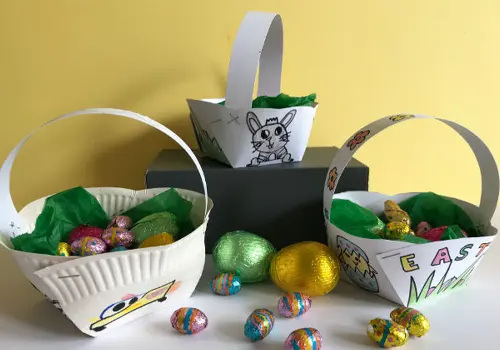
Materials Needed:
- Markers
- Paper plate
- Scissors
- Colored construction paper
- Glue
- Ribbon or yarn (for the handle)
Preschool Crafts Instructions:
- Cut the paper plate in half and fold up the edges to form the basket.
- Cut out various colored egg shapes from construction paper and glue them inside the basket.
- Draw designs on the paper eggs using markers.
- Attach a ribbon or yarn as a handle to the top of the basket.
- Allow it to dry before using the basket for Easter egg hunts or decorations.
Developmental Benefits: Easter crafts for preschoolers encourage creativity, fine motor skills, and spatial awareness while making a fun Easter decoration.
30. Bunny Footprint Craft
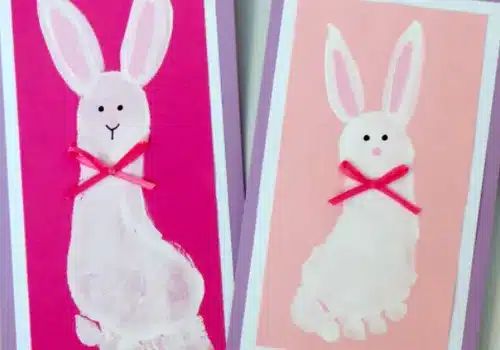
Materials Needed:
- Pink paint (for footprint)
- White construction paper
- Pink and black construction paper
- Scissors
- Glue
Preschool Crafts Instructions:
- Have the child dip their feet in pink paint and stamp them onto a sheet of white construction paper to form the bunny’s feet.
- Once dry, cut out bunny ears from pink and white construction paper and glue them above the footprints.
- Cut out a small pink circle for the nose and glue it onto the bottom of the feet to form the bunny’s face.
- Use a black marker to draw whiskers and a mouth.
Developmental Benefits: Easter crafts for preschoolers promote sensory exploration and encourages fine motor skills through stamping and gluing. It also creates a personalized keepsake for Easter!
Popular Montessori Preschool Crafts
These preschool crafts are designed to be fun and educational, helping children develop essential skills while they explore their creativity. These popular preschool crafts are perfect examples of how Montessori principles can be implemented. Each activity is easy to set up, engaging for young children, and filled with opportunities for hands-on learning.

31. Leaf Rubbings
Leaf rubbings are a classic Montessori activity that combines art with nature study. To do this craft, collect various leaves, place them under a sheet of paper, and have children rub a crayon over the top. As the crayon moves across the paper, the texture and shape of the leaf will appear. This activity teaches children about different types of leaves and helps develop their fine motor skills as they carefully rub the crayon to reveal the leaf’s details.
32. Pinecone Bird Feeders
Creating pinecone bird feeders is a beautiful way to connect preschoolers with nature. All you need are pinecones, peanut butter, and birdseed. Children can spread the peanut butter on the pinecone and roll it in birdseed. Once they’re done, hang the feeders outside and watch as birds come to eat. This craft is fun and easy, teaching children about wildlife and caring for nature.
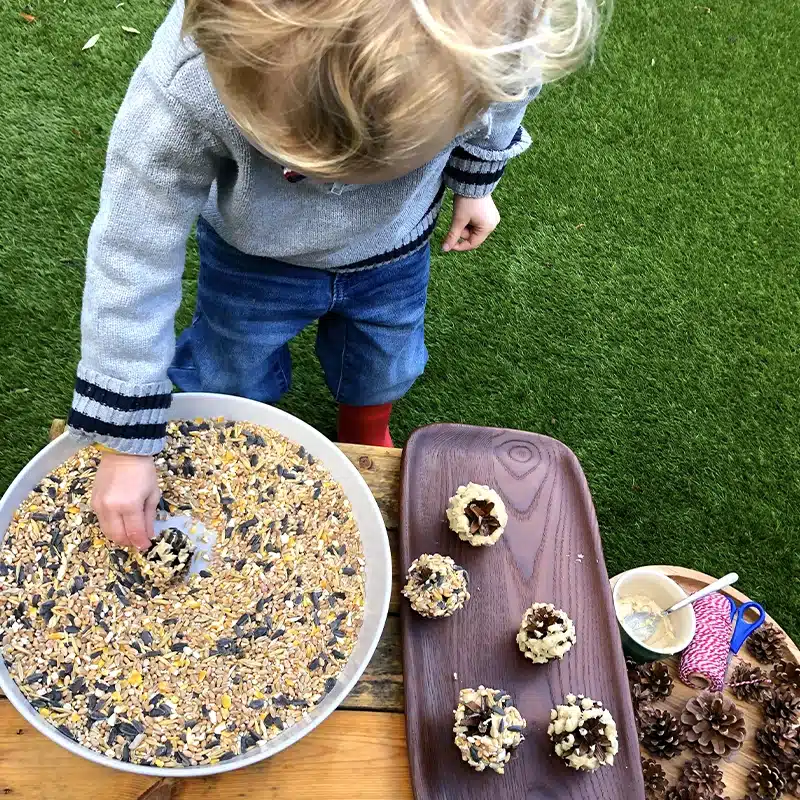
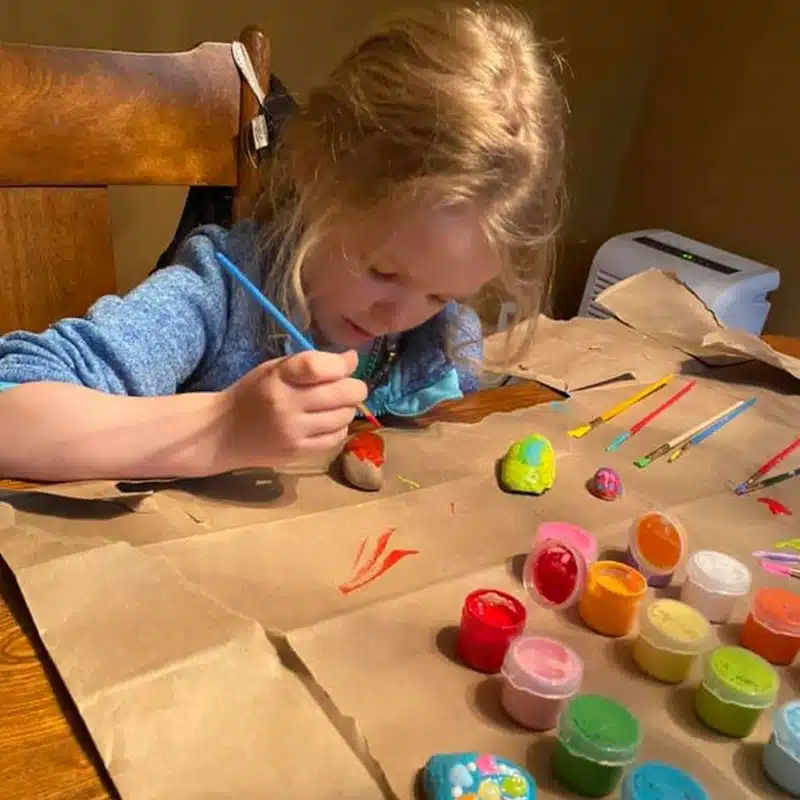
33. Rock Painting
Rock painting is a simple but highly engaging preschool craft. Children can collect smooth stones from the outside and paint them with non-toxic paints. They might choose to paint animals, patterns, or even their names. This activity encourages creativity and helps children practice fine motor skills as they carefully apply the paint. Plus, painted rocks can be used in various ways, such as decorations, story stones, or gifts.
34. Nature Collages
Nature collages are a great way to combine a walk in the park with an art project. During a nature walk, encourage children to collect small items like leaves, flowers, twigs, and seeds. When you return, they can arrange these items on paper or cardboard to create a collage. This craft helps children observe the natural world closely and understand different textures, colors, and shapes. It’s also a fantastic way to introduce them to recycling, as they use found objects to create something new.
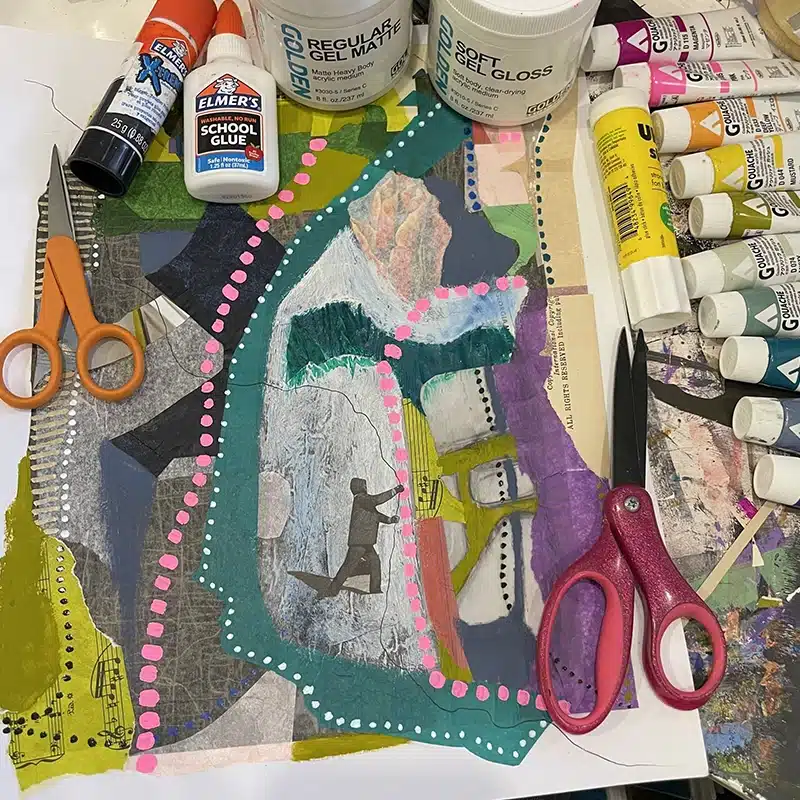
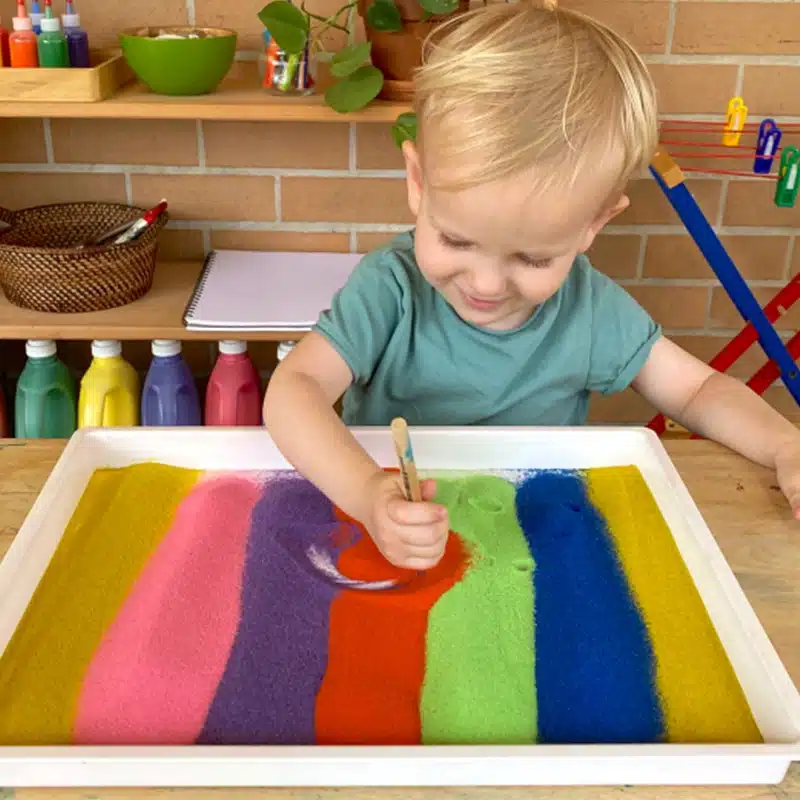
35. Sand Art
Sand art is an excellent sensory activity that allows children to explore colors and textures. Provide them with various colored sand and containers, such as jars or trays, where they can create patterns and designs. This preschool craft encourages creativity and helps develop fine motor control as children carefully pour and shape the sand. The finished product is always unique; children will love displaying their colorful creations.
36. Egg Carton Caterpillars
Egg carton caterpillars are a fun way to recycle materials while creating something cute and educational. Start by cutting an egg carton into sections. Each section will become a “segment” of the caterpillar’s body. Children can paint the sections and add googly eyes, pipe cleaner antennae, and other decorations. This craft is not only fun but also an excellent opportunity to teach children about the life cycle of a butterfly.
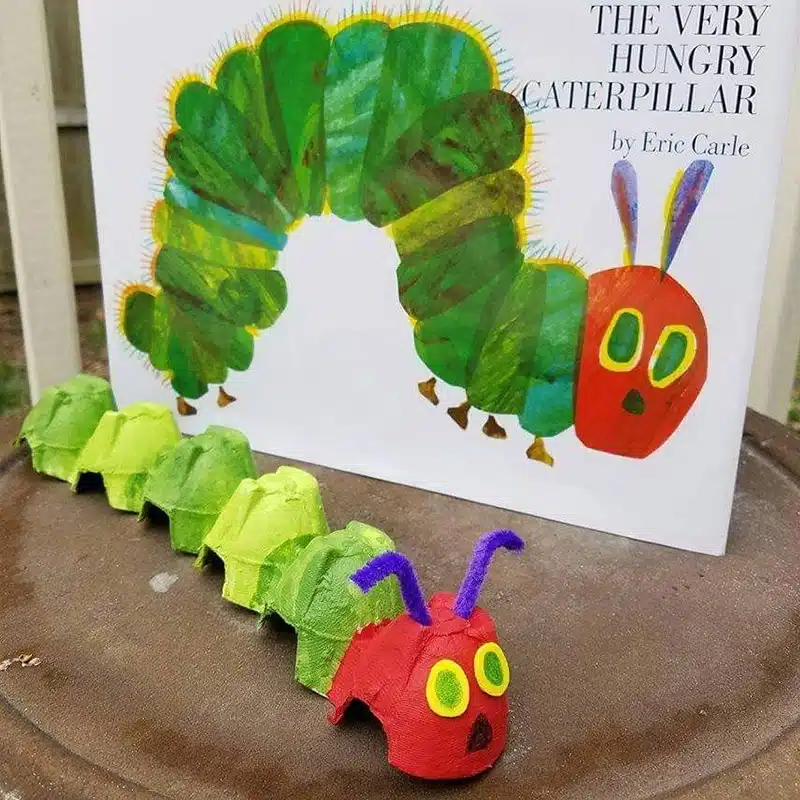

37. Flower Pressing
Flower pressing is a beautiful way to preserve nature and create lasting art. During a walk, have children collect flowers and leaves. Press the flowers between sheets of paper inside a heavy book at home. After a week or so, the flowers will be dried and ready to use in art projects, such as making greeting cards, decorating journals, or framing. This preschool craft teaches patience and helps children appreciate the delicate beauty of nature.
38. Twig Frame
Twig frames are an excellent way to combine natural materials with creative expression. Children can gather twigs of various sizes and use them to create a simple frame. They can glue the twigs together and decorate the frame with leaves, small flowers, or other natural items. Once the frame is complete, children can use it to display a photo or a piece of their artwork. This craft not only develops fine motor skills but also encourages children to think creatively about how to use natural materials.

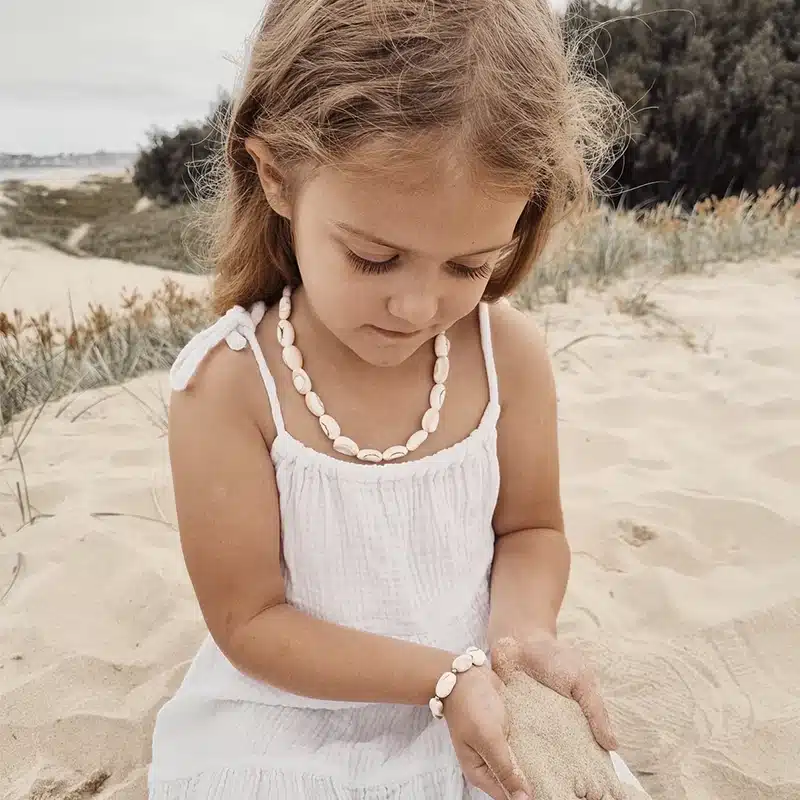
39. Shell Necklaces
Making shell necklaces is a delightful preschool craft if you live near the beach or can access seashells. Children can select their favorite shells and, with the help of an adult, drill small holes in them. They can then string the shells onto yarn or a thin piece of leather to create a necklace. This craft helps children develop fine motor skills and introduces them to jewelry-making basics. Plus, it’s a lovely way for them to carry a piece of the beach.
40. Sun Prints
Sun prints are a fascinating way to combine art and science. To make a sun print, place natural objects like leaves, flowers, or feathers on light-sensitive paper and expose it to sunlight for a few minutes. When the objects are removed, their shapes will be left on the paper, creating a beautiful print. This preschool craft is visually striking and an excellent way to teach children about the effects of sunlight and the properties of different materials.

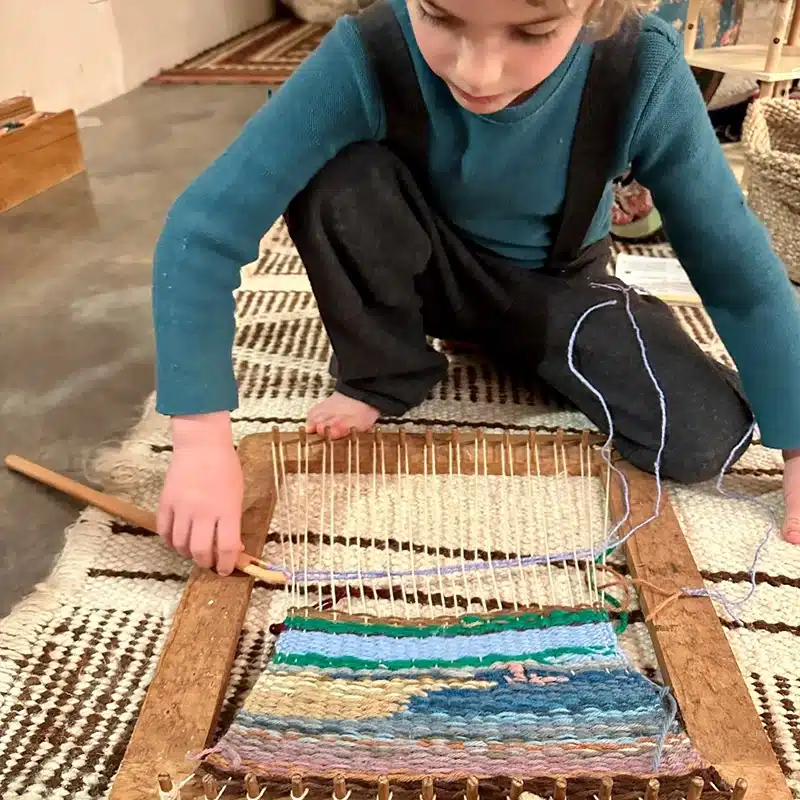
41. Needle Weaving
Needle weaving is a traditional craft perfect for developing fine motor skills and concentration. Children can gather long pine needles to weave simple mats or coasters. This activity requires patience and precision, making it an excellent way for children to practice focusing on a task. The finished products can be used as small gifts or personal treasures.
42. Acorn Cap Boats
Acorn cap boats are a delightful way to explore the concept of buoyancy while crafting. After gathering acorn caps, children can float them in a water bowl and see which can hold small objects like pebbles or beads. This preschool craft is simple yet educational, teaching children about balance, floating, and sinking in a fun and hands-on way.
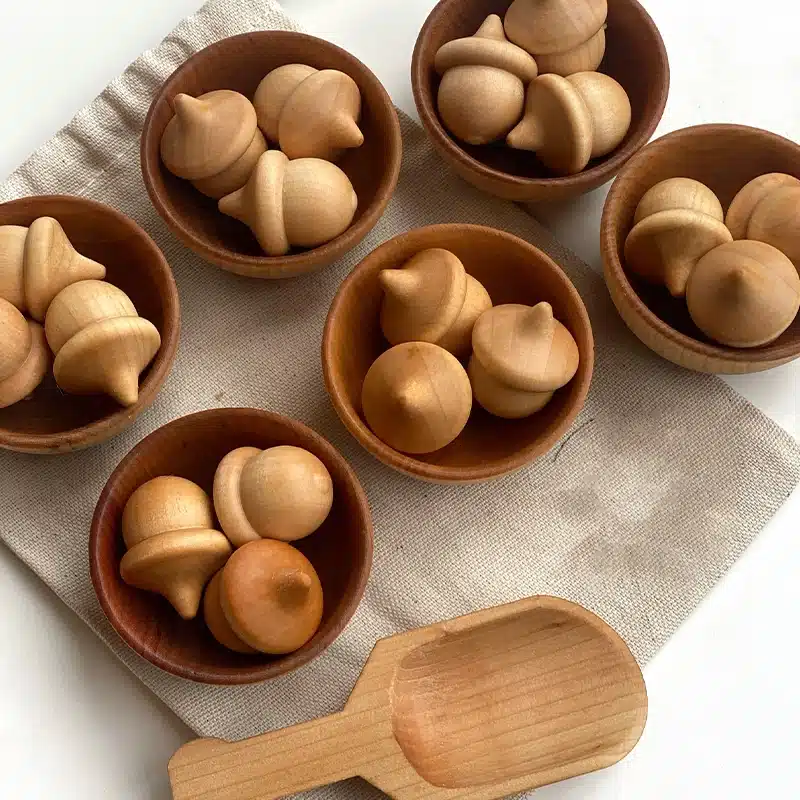
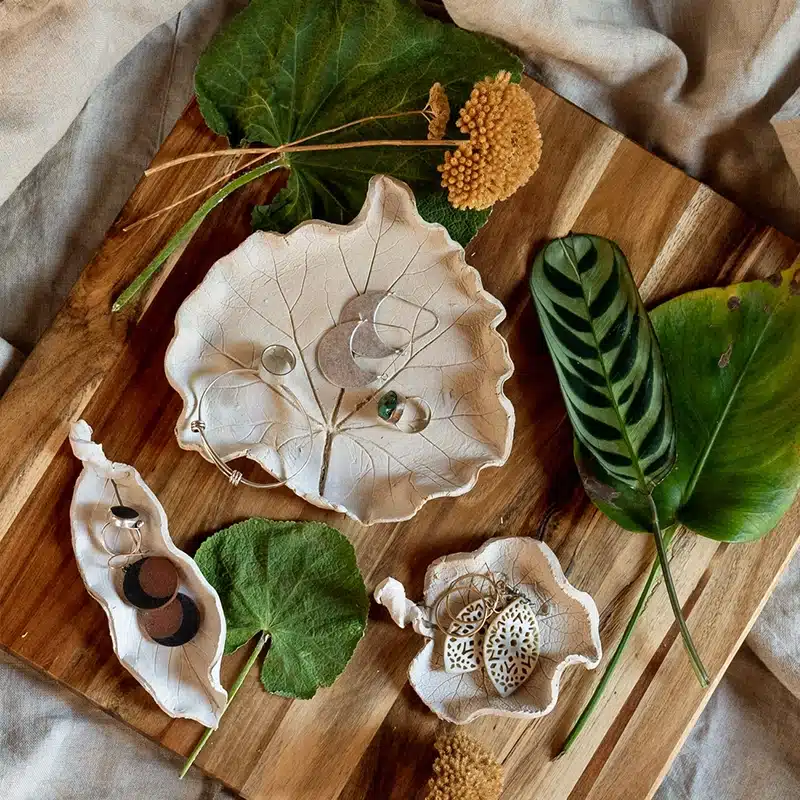
43. Clay Leaf Imprints
Clay leaf imprints are a fantastic way to combine art with nature exploration. Roll out some clay and press different leaves into it to leave an imprint. Once the clay dries, children can paint their creations. This craft not only enhances fine motor skills but also helps children learn about different types of leaves and the textures they have.
44. Stick Puppets
Stick puppets are a fun, creative preschool craft that encourages storytelling and imaginative play. Children can use small sticks and natural materials to create simple puppets. They can add features using leaves, flowers, and other found objects. Once the puppets are made, children can use them to act out stories, which promotes language development and creative thinking.
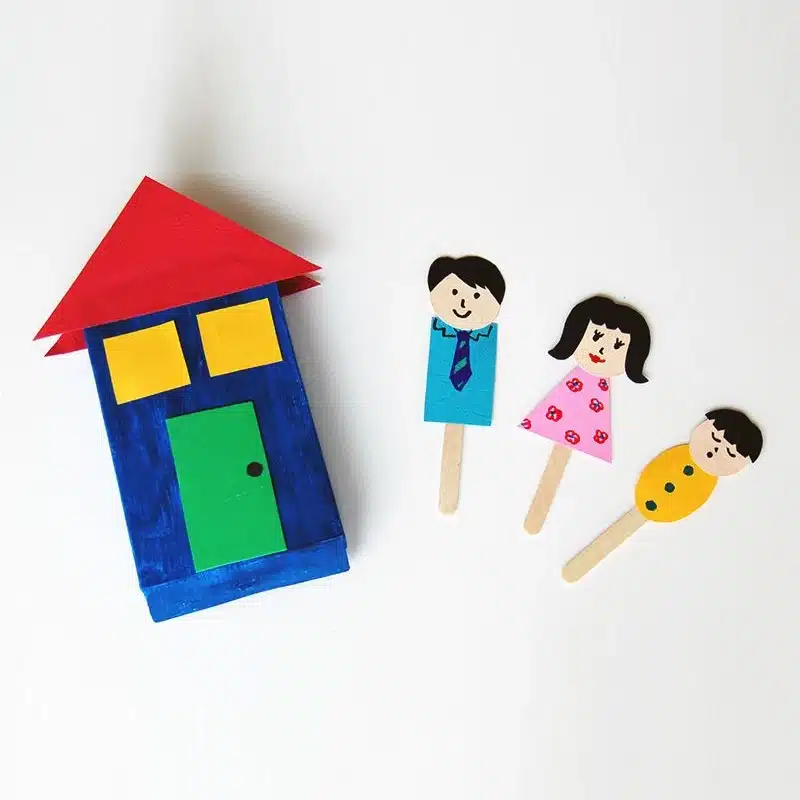
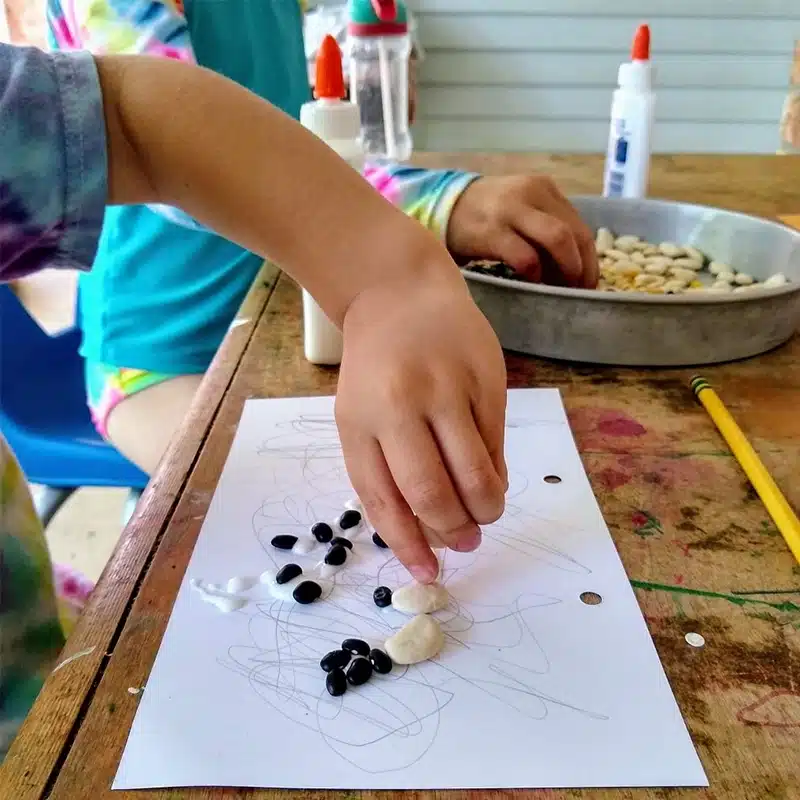
45. Seed Mosaic
Seed mosaics are an excellent way to introduce children to patterns and symmetry using natural materials. Provide children with various seeds in different shapes, sizes, and colors. They can arrange the seeds on cardboard or paper to create a mosaic design. This preschool craft is visually appealing and helps children develop their fine motor skills and understanding of geometric concepts.
46. Mud Painting
Mud painting is a messy but enjoyable preschool craft that allows children to use natural materials creatively. All you need is some mud and a large sheet of paper or cardboard. Children can use their hands, sticks, or other objects to paint with the mud, creating abstract designs or pictures. This activity is a great way to engage children’s senses and encourage them to experiment with different textures and materials.
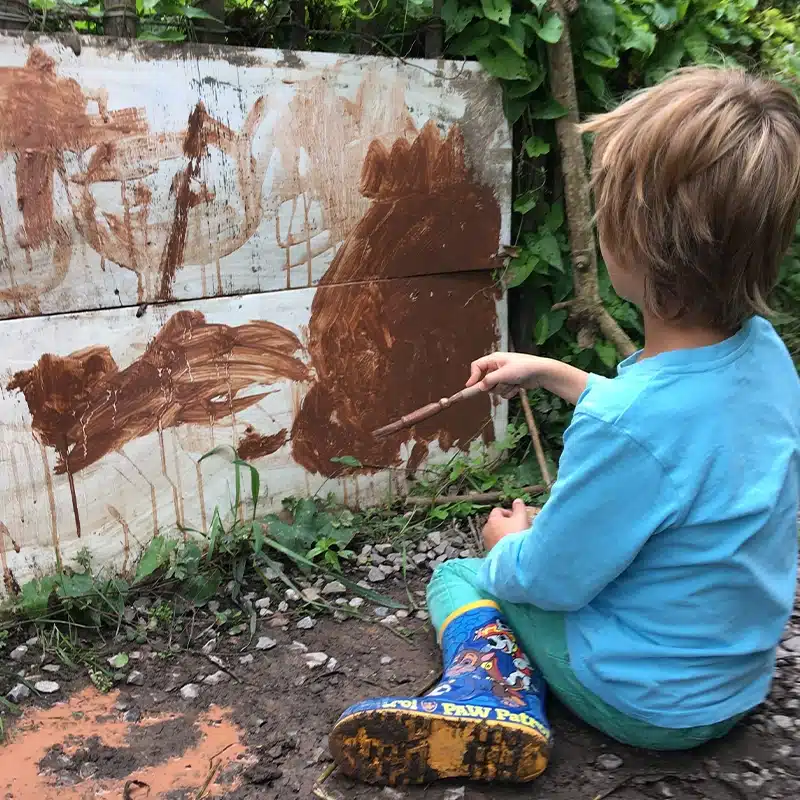

47. Ice Block Sculptures
Ice block sculptures are an excellent and refreshing craft for warm days. Freeze water in various molds to different shapes and sizes of ice blocks blocks. Children can use these blocks to build sculptures, towers, or imaginable imagine. This preschool craft introduces basic engineering concepts as children learn to balance and stack the ice blocks. It’s also a great sensory experience as they feel the cold, slippery surface of the ice.
48. Grass Crown
Making a grass crown is a simple and delightful way to connect with nature. Show children how to braid or weave long strands of grass to create a crown. They can decorate their crowns with flowers, leaves, or other natural items they find. This preschool craft is fun and encourages children to use their fine motor skills and creativity to create something beautiful from the natural world.

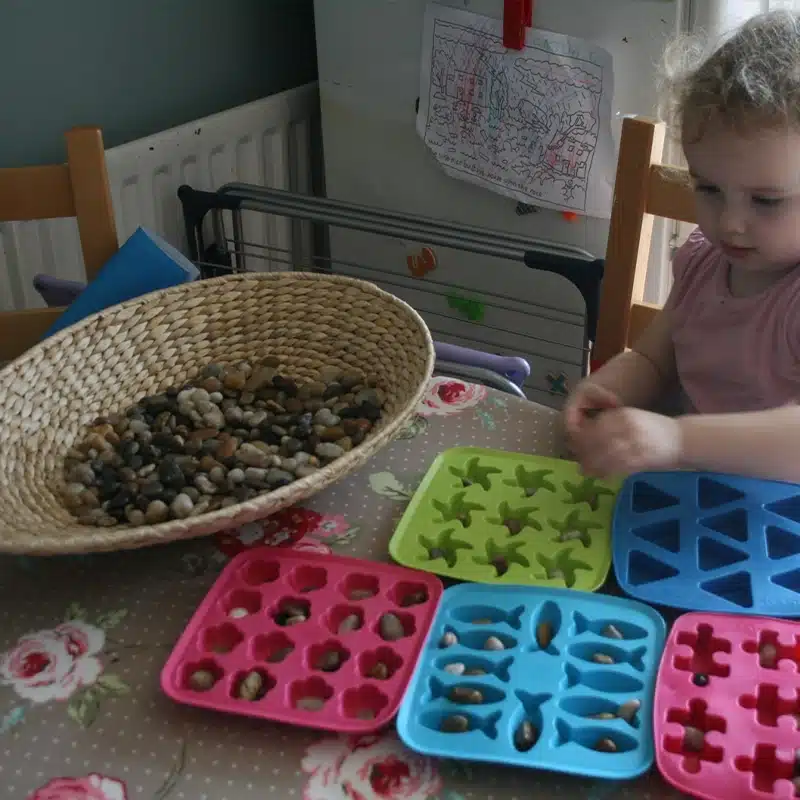
49. Pebble Sorting
Pebble sorting is a simple yet effective preschool craft that teaches sorting and categorization skills. Gather a variety of pebbles in different colors, sizes, and textures. Children can sort the pebbles into groups based on these characteristics. This activity helps develop their cognitive skills and understanding of basic math concepts while also being a tactile and engaging way to explore natural materials.
50. Shell and Sand Art
Shell and sand art creatively and educationally combines two natural elements. Children can use shells and sand to create textured art on a piece of cardboard or in a shallow tray. They can arrange the shells to form patterns or pictures and then use the sand to fill the gaps. This preschool craft is a beautiful way to explore different textures and materials while encouraging creativity and fine motor skills.
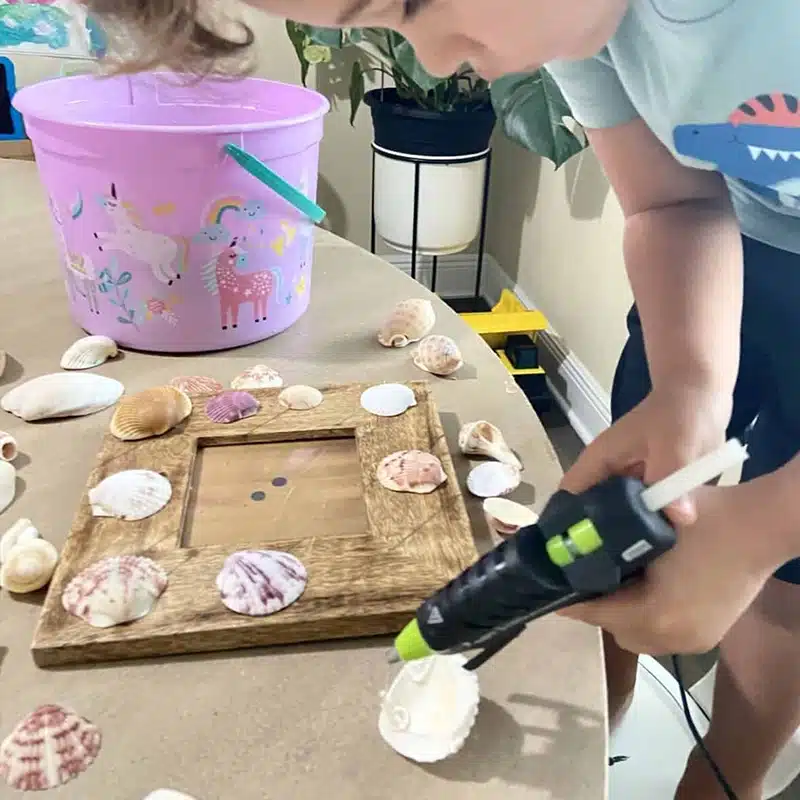
Why Are Preschool Crafts Important for Child Development?
Arts and crafts play a much more significant role in a child’s development than many might realize. They’re not just simple activities that keep kids busy but essential tools for learning and growth. Especially when we look at preschool crafts, we see that these creative projects are fundamental to a child’s early education and overall development.
Enhancing Fine Motor Skills
One of the most immediate benefits of preschool crafts is the development of fine motor skills. These skills are crucial for young children because they involve the small muscle movements in the hands and fingers needed for writing, buttoning clothes, and tying shoes. Children practice and strengthen these muscles by cutting with scissors, gluing small objects, or drawing with crayons. Over time, this leads to better hand-eye coordination, agility, and control, all essential for more complex tasks they will face as they age.
Imagine a child learning to use scissors for the first time during a craft activity. At first, it might be challenging for them to control the tool and cut along a line. However, with practice through various preschool crafts, they gradually develop the skill to cut accurately and confidently. This improvement doesn’t just stop at the craft table; it transfers to other areas of their life, helping them with daily tasks and academic activities.
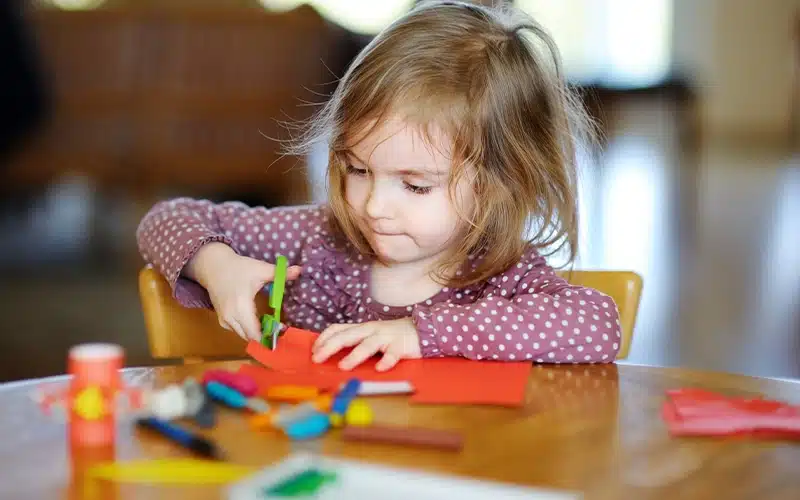
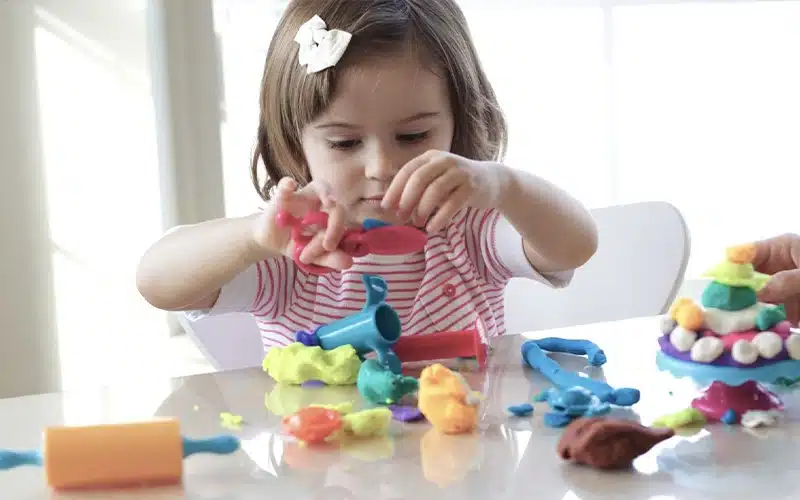
Encouraging Creativity and Imagination
Creativity is vital to a child’s development, and preschool crafts are one of the best ways to nurture it. When children are free to create, they learn to think outside the box, explore new ideas, and use their imagination to solve problems. For example, a simple craft project where a child is asked to create an animal using leaves and twigs can become a creativity lesson. Using pine needles, the child might make a dragon out of leaves or a bird. Imagining and creating something entirely new helps children develop innovative thinking skills they will use throughout their lives.
In the Montessori method, creativity is not just encouraged—it’s celebrated. Children are given the tools and materials they need and then allowed to explore their creativity in a guided but open-ended way. This kind of imaginative play is essential for their cognitive development. It helps them learn to think critically and solve problems, both crucial skills as they begin their educational journey and later in life.
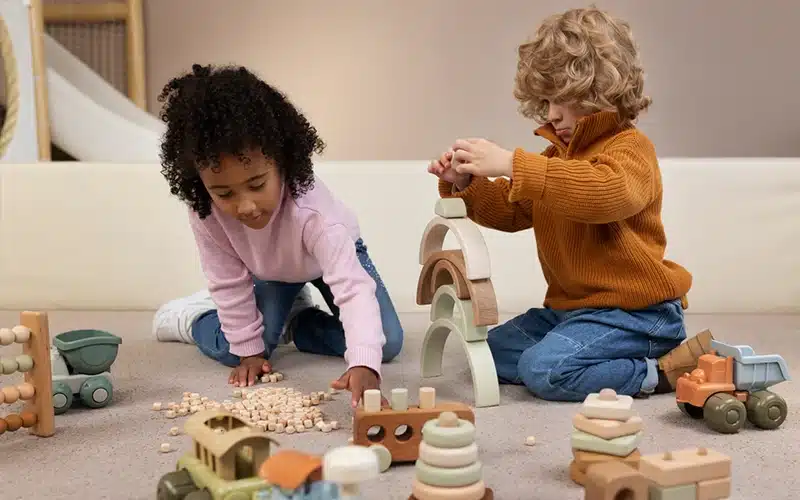
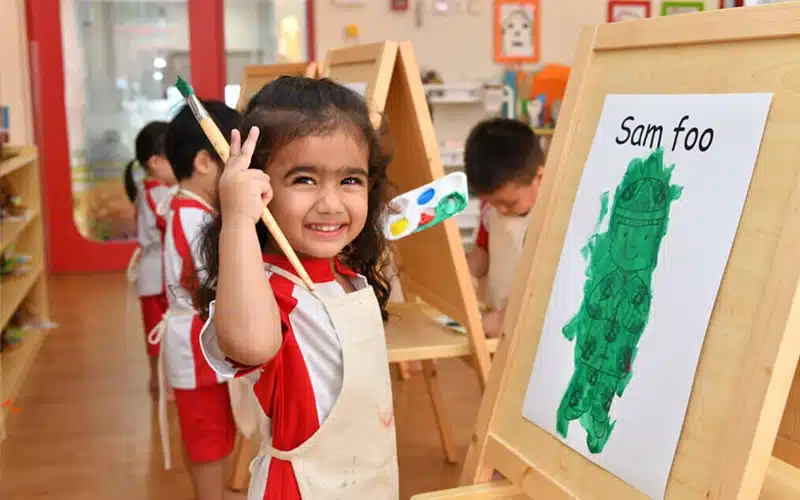
Promoting Self-Expression
Preschool crafts provide children with a unique opportunity to express themselves. Unlike other forms of learning that might be more structured or guided, crafting allows children to communicate their thoughts, feelings, and ideas very personally. Whether painting a picture, molding clay, or assembling a collage, they choose colors, shapes, and designs that reflect their inner world.
For many children, especially those who may not yet have the words to express themselves verbally, arts and crafts become a vital outlet for their emotions. A child who might be shy or reserved in other settings can often communicate their feelings through their artwork. For instance, a child going through a tough time might choose darker colors or create something that represents their feelings. Recognizing and discussing these choices with them can be a powerful way to help children process their emotions and develop a healthy way to express themselves.


Developing Cognitive Skills
Crafting is not just about making something beautiful; it’s also about developing the brain. Engaging in preschool crafts requires children to follow instructions, think ahead, and make decisions. These activities greatly enhance their cognitive development by involving planning, problem-solving, and decision-making skills.
For example, when children are asked to create a craft that requires multiple steps—like building a bird feeder from pinecones and string—they have to think about what comes first, how to assemble the pieces, and how to fix any mistakes they make. This process helps them improve their memory, concentration, and logical thinking. These skills are crucial for crafting and overall academic success as they grow older.
Additionally, preschool crafts often involve categorizing, sorting, and organizing materials, which are critical cognitive skills. When children sort different colors of beads or organize leaves by size, they’re practicing critical mental processes that will help them in math, science, and other subjects in the future.
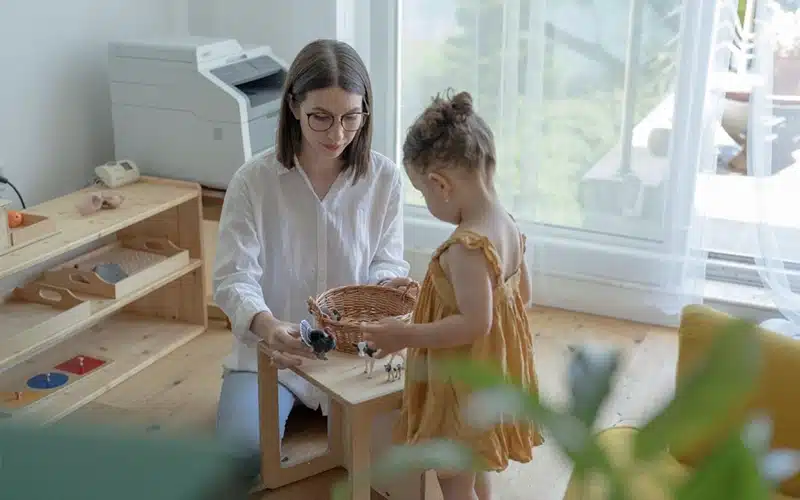

Boosting Confidence and Self-Esteem
One of the most rewarding aspects of engaging in preschool crafts is the boost in confidence and self-esteem that children experience. Completing a craft project, especially one they have worked on for a while gives children a great sense of accomplishment. They can see the results of their hard work and creativity, which makes them feel proud of themselves.
This feeling of pride and accomplishment is critical for their self-esteem. When children complete a craft, they believe in their abilities and are likelier to take on new challenges with a positive attitude. This is particularly important in a Montessori setting, where the focus is on self-directed learning. Children who feel confident in their abilities are more likely to engage in new activities and take risks, which leads to more understanding and growth.
For instance, when a child proudly shows off a clay model they’ve made or a painted picture, they display their work and demonstrate their growing confidence. Positive reinforcement from parents, teachers, or peers can further boost this confidence, encouraging them to continue exploring their creative side.

Fostering Social Skills
Finally, preschool crafts are an excellent way to foster social skills in young children. Crafting is often done in groups at school, daycare, or even with siblings. These group settings allow children to learn how to share materials, take turns, and work together on projects. They learn to communicate their ideas, listen to others, and cooperate to achieve a common goal.
In a Montessori classroom, collaboration is a critical component of learning. Children who work on crafts learn to interact socially, respect others’ ideas, and contribute to a group effort. These social skills are crucial for their overall development and will serve them well as they age and navigate more complex social situations.
For example, a group craft project, such as creating a large mural or constructing a model village from natural materials, requires children to discuss their ideas, delegate tasks, and help each other. This collaborative effort teaches them the value of teamwork and the importance of working together to achieve something greater than they could.
In conclusion, arts and crafts, notably preschool crafts, are vital to a child’s development. They help children grow in countless ways, from enhancing their fine motor skills to fostering creativity and imagination, promoting self-expression, and developing cognitive and social skills. By incorporating these activities into a child’s routine, whether at home or in the classroom, we are giving them the tools they need to thrive both now and in the future.
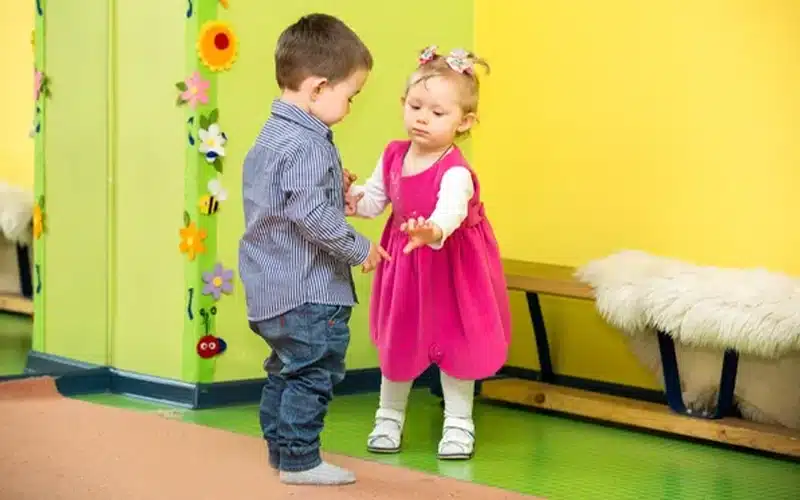
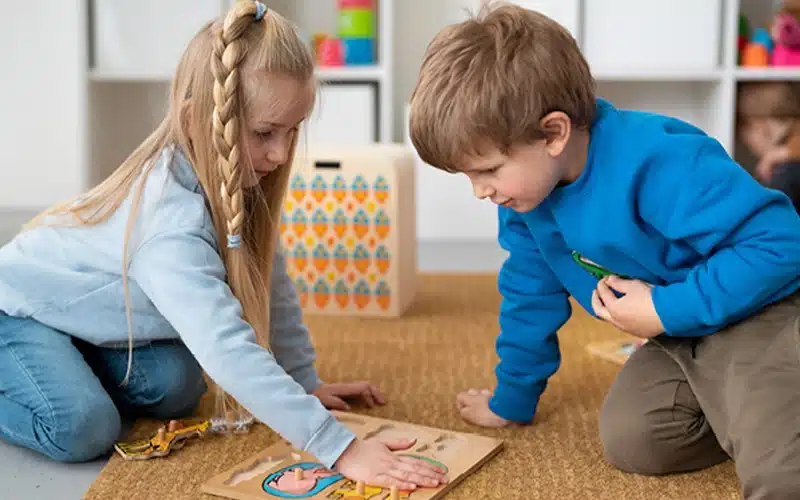
Let the Fun Begin
These 20 Montessori-inspired preschool crafts using natural materials are just the beginning of what can be a rich and rewarding journey for both children and adults. Children don’t just have fun by engaging in these activities—they gain invaluable skills and knowledge that lay the foundation for their future learning and development. Each craft is carefully designed to be more than just a creative outlet; it’s an educational experience that nurtures the whole child. Whether it’s enhancing fine motor skills through precise cutting and gluing, fostering creativity by allowing children to explore different materials, or promoting social skills through collaborative crafting sessions, these activities are tailored to preschoolers’ developmental needs.
One of the most significant benefits of these preschool crafts is their adaptability. They can be easily modified to suit different age groups, skill levels, and interests. This flexibility means that whether you’re working with a group of young children in a classroom setting or doing a one-on-one activity at home, you can tailor the experience to be both challenging and enjoyable for the child. Moreover, because these crafts use natural materials, they help children develop a deep connection with the environment. As they collect leaves, twigs, shells, and stones for their projects, they learn to appreciate the beauty of nature and understand the importance of caring for our planet.
By incorporating these preschool crafts into your routine, you are not just providing entertainment for children; you are creating opportunities for meaningful, hands-on learning. These activities encourage children to think critically, make decisions, and express themselves in ways that are both creative and constructive. And because they are fun, children are more likely to engage fully, making the learning process enjoyable and effective. So, gather your materials—leaves from the backyard, stones from a nature walk, or sand from the beach—and let the crafting adventures begin. These experiences will not only bring joy to the children but also leave lasting memories that they will cherish as they grow.
Conclusion
Preschool crafts are far more than just a way to keep young children occupied; they are a vital part of a well-rounded education that addresses multiple areas of development. These crafts are essential in the Montessori philosophy, which emphasizes hands-on learning and using natural materials. They allow children to explore the world around them, express their creativity, and develop essential skills to serve them throughout their lives. Each craft project offers a chance for children to learn something new—whether it’s mastering the fine motor control needed to thread beads onto a string, developing the cognitive skills required to plan and execute a project, or experiencing the social benefits of working together with others on a shared task.
By regularly engaging in preschool crafts, children build confidence in their abilities. They learn that they can turn simple materials into something beautiful and meaningful. This sense of accomplishment is crucial for their self-esteem and motivates them to tackle more challenging tasks in the future. Additionally, because these crafts often involve natural materials, they help children develop an appreciation for the environment and an understanding of the natural world. This connection to nature will benefit them for years, fostering a sense of responsibility towards the planet and its resources.
Incorporating these 20 Montessori-inspired preschool crafts into your educational practices is more than just adding fun activities to your day; it’s about enriching the lives of children by helping them grow creatively, cognitively, and socially. These crafts offer a way to connect with children on a deeper level, allowing them to develop in a holistic way that prepares them not just for school, but for life. As we embrace the joy of crafting, we also embrace the opportunity to watch our children flourish in every aspect of their development. Let’s make these crafts a regular part of our routine and witness firsthand the many ways they contribute to the growth and happiness of our children.

